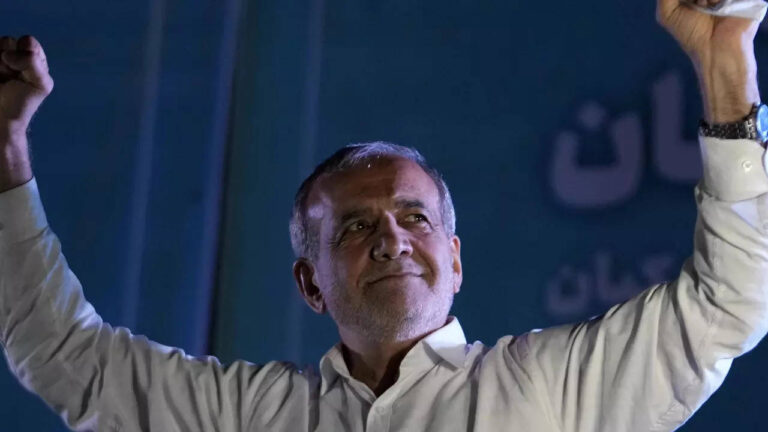NEW DELHI: The only reformist candidate in Iran’s presidential election, Massoud Pezeshkian, has risen from relative obscurity to become the Islamic Republic’s ninth president. The 69-year-old won about 53.6% of the vote in the runoff election against ultra-conservative Saeed Jalili.
While Pezeshkian’s victory has raised hopes among reformists in Iran, a country long dominated by conservatives and ultra-conservatives, his rise is unlikely to have a major impact on Tehran’s bilateral ties with India in the near future.
Shortly after Iran’s announcement, Prime Minister Narendra Modi congratulated Pezeshkian.
“I look forward to working closely together to further strengthen our warm and long-standing bilateral relations for the benefit of our two peoples and the region,” PM Modi said in a post on X.
Sanctions and oil
Pezeshkian has vowed to open Iran to the world and grant greater freedoms, while recognizing Supreme Leader Ayatollah Ali Khamenei as the highest authority on national affairs.
Pezeshkian’s moderate stance and advocacy of limited reforms may lead to some changes in Iran’s domestic policies, such as loosening enforcement of the headscarf law, but her ability to effect a major shift in Iran’s foreign policy is constrained by the fact that the government remains largely controlled by hardliners.
Still, Pezeshkian’s victory may signal a gradual shift toward more moderate voices in Iran’s political landscape — a trend that, if continued, could lead Western countries, especially the United States, to consider lifting some of the sanctions, potentially creating an opportunity for India to negotiate with Iran on a broader range of issues in the future.
Iran, one of India’s main crude oil suppliers, may also be considering offering more favorable terms and increasing crude exports to India amid ongoing Western sanctions.
Chabahar Port and Trade Route
India and Iran have maintained a relatively stable relationship in recent years, and the two countries have cooperated on issues such as the development of the Chabahar port and connectivity projects such as the International North-South Transport Corridor (INSTC), a multimodal transport route connecting India and Russia via Iran.
Pezeshkian is expected to maintain and deepen economic ties between India and Iran, with a particular focus on the strategic Chabahar port project, which is crucial for India’s connectivity with Afghanistan and Central Asia. He is likely to further strengthen existing cooperation and investments in the project.
While Pezeshkian’s victory has raised hopes among reformists in Iran, a country long dominated by conservatives and ultra-conservatives, his rise is unlikely to have a major impact on Tehran’s bilateral ties with India in the near future.
Shortly after Iran’s announcement, Prime Minister Narendra Modi congratulated Pezeshkian.
“I look forward to working closely together to further strengthen our warm and long-standing bilateral relations for the benefit of our two peoples and the region,” PM Modi said in a post on X.
Sanctions and oil
Pezeshkian has vowed to open Iran to the world and grant greater freedoms, while recognizing Supreme Leader Ayatollah Ali Khamenei as the highest authority on national affairs.
Pezeshkian’s moderate stance and advocacy of limited reforms may lead to some changes in Iran’s domestic policies, such as loosening enforcement of the headscarf law, but her ability to effect a major shift in Iran’s foreign policy is constrained by the fact that the government remains largely controlled by hardliners.
Still, Pezeshkian’s victory may signal a gradual shift toward more moderate voices in Iran’s political landscape — a trend that, if continued, could lead Western countries, especially the United States, to consider lifting some of the sanctions, potentially creating an opportunity for India to negotiate with Iran on a broader range of issues in the future.
Iran, one of India’s main crude oil suppliers, may also be considering offering more favorable terms and increasing crude exports to India amid ongoing Western sanctions.
Chabahar Port and Trade Route
India and Iran have maintained a relatively stable relationship in recent years, and the two countries have cooperated on issues such as the development of the Chabahar port and connectivity projects such as the International North-South Transport Corridor (INSTC), a multimodal transport route connecting India and Russia via Iran.
Pezeshkian is expected to maintain and deepen economic ties between India and Iran, with a particular focus on the strategic Chabahar port project, which is crucial for India’s connectivity with Afghanistan and Central Asia. He is likely to further strengthen existing cooperation and investments in the project.
- Chabahar port is a project in which India has already invested heavily. Chabahar is a key transit point for trade with Afghanistan and Central Asia, bypassing Pakistan.
- India has pledged $120 million for the development of the Shahid Beheshti port terminal in Chabahar and provided a $250 million line of credit for Iranian infrastructure projects.
- New Delhi sees the Chabahar port project as a way to “de-risk” trade between India and Eurasia.
Other important ways in which India-Iran relations may change under Pezechkian’s administration
- Improved diplomatic relations: Pezechkian’s more moderate and pragmatic approach than hardline opponents such as Saeed Jalili, whom he defeated, is likely to further strengthen ties between Iran and India. Political experts said Pezechkian is someone “who countries around the world will likely welcome in the hope of finding a peaceful solution to the tense standoff with Iran.”
- Potential economic opportunities: If Pezeshkian can secure the lifting of sanctions, it could create new economic opportunities for India to engage with Iran, particularly in areas such as trade, investment and energy cooperation.
- Strengthening people-to-people connections: Prime Minister Pezechkian’s pledge to relax social restrictions and promote political pluralism could pave the way for greater people-to-people exchanges and cultural cooperation between Iran and India.
- Uncertainty over Ayatollah Khamenei’s successor: Pezechkian’s role in selecting the next supreme leader could be crucial, as the decision will shape Iran’s future direction and its long-term relationship with India.

